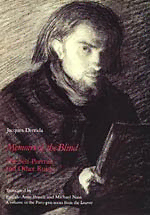
Memoirs of the Blind: The Self-Portrait and Other Ruins PDF
150 Pages·1993·15.296 MB·English
Most books are stored in the elastic cloud where traffic is expensive. For this reason, we have a limit on daily download.
Preview Memoirs of the Blind: The Self-Portrait and Other Ruins
Description:
In this brilliant essay, Jacques Derrida explores issues ofvision, blindness, self-representation, and their relation todrawing, while offering detailed readings of an extraordinarycollection of images. Selected by Derrida from the printsand drawings department of the Louvre, the works depictblindness—fictional, historical, and biblical. From Oldand New Testament scenes to the myth of Perseus and theGorgon and the blinding of Polyphemus, Derrida uncovers inthese images rich, provocative layers of interpretation.For Derrida drawing is itself blind; as an act rooted inmemory and anticipation, drawing necessarily replaces onekind of seeing (direct) with another (mediated). Ultimately,he explains, the very lines which compose any drawing arethemselves never fully visible to the viewer since they existonly in a tenuous state of multiple identities: as marks ona page, as indicators of a contour. Lacking a "pure"identity, the lines of a drawing summon the supplement of theword, of verbal discourse, and, in doing so, obscure thevisual experience. Consequently, Derrida demonstrates, thevery act of depicting a blind person undertakes multipleenactments and statements of blindness and sight.Memoirs of the Blind is both a sophisticatedphilosophical argument and a series of detailed readings.Derrida provides compelling insights into famous and lesserknown works, interweaving analyses of texts—includingDiderot's Lettres sur les aveugles, the notion ofmnemonic art in Baudelaire's The Painter of Modern Life, and Merleau-Ponty's The Visible and the Invisible. Along with engaging meditations on the historyand philosophy of art, Derrida reveals the ways viewersapproach philosophical ideas through art, and the ways artenriches philosophical reflection.An exploration of sight, representation, and art,Memoirs of the Blind extends and deepens themeditation on vision and painting presented in Truth and Painting. Readers of Derrida, both new and familiar, willprofit from this powerful contribution to the study of thevisual arts.
See more
The list of books you might like
Most books are stored in the elastic cloud where traffic is expensive. For this reason, we have a limit on daily download.
